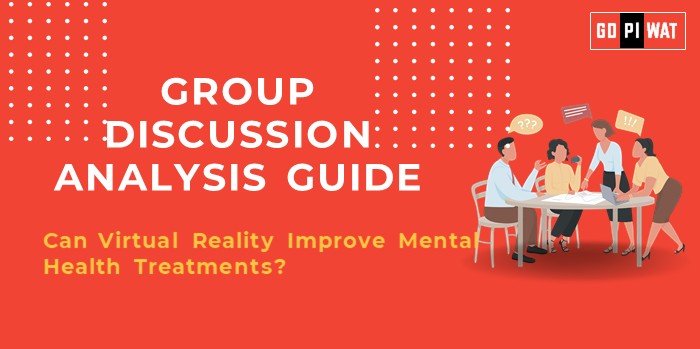📋 Group Discussion Analysis Guide: Can Virtual Reality Improve Mental Health Treatments?
🌐 Introduction to the Topic
Opening Context: “Virtual reality (VR), once primarily associated with gaming and entertainment, is now emerging as a transformative tool in mental health treatments, offering immersive experiences that facilitate therapeutic breakthroughs.”
Topic Background: VR’s journey into mental health began with exposure therapy for phobias. Today, it extends to conditions such as PTSD, depression, and anxiety disorders, thanks to advancements in immersive technologies. The ongoing integration of VR with AI amplifies its potential to personalize treatments and monitor outcomes effectively.
📊 Quick Facts and Key Statistics
• Effectiveness of VR in PTSD Therapy: 75% reduction in symptoms for veterans undergoing VR-based exposure therapy (Journal of Traumatic Stress).
• Cost of Traditional Therapy vs. VR Therapy: VR-based therapy costs 20–30% less due to reduced session time and higher engagement (HealthTech Magazine).
• VR Penetration: 25% of leading mental health centers globally have adopted VR tools as of 2023.
🌟 Stakeholders and Their Roles
- 🏥 Healthcare Providers: Innovating therapy models and integrating VR into existing treatment protocols.
- 💡 Tech Companies: Developing advanced VR applications tailored for mental health scenarios.
- 🤝 Patients: Benefiting from immersive, low-stigma, and engaging therapy methods.
- ⚖️ Regulators: Ensuring ethical standards, privacy, and safety in VR treatment applications.
- 📚 Academia: Researching the efficacy and long-term impacts of VR in mental health.
🏆 Achievements and Challenges
Achievements:
- ✅ Enhanced Engagement: Studies show VR therapy increases patient adherence by 40% compared to traditional methods.
- ✅ Treatment Accessibility: Mobile VR headsets make therapy more accessible to remote or underserved populations.
- ✅ Reduced Costs: Scalable solutions decrease dependency on expensive physical setups.
Challenges:
- ⚠️ High Initial Costs: VR hardware and software remain unaffordable for small practices.
- ⚠️ Data Security Concerns: Personal data collected during VR sessions requires robust cybersecurity measures.
- ⚠️ Standardization Issues: Lack of universal protocols in VR therapy.
🌍 Global Comparisons:
- 🇺🇸 USA: Leading adoption with the Department of Veterans Affairs integrating VR for PTSD.
- 🇳🇱 Europe: Countries like the Netherlands emphasize VR for depression and anxiety.
- 🇮🇳 India: Emerging focus, limited to metropolitan cities due to infrastructure constraints.
📘 Case Studies: UK’s Oxford VR: Successfully used in treating social anxiety with 90% patient satisfaction.
Australia’s MindSpot: Combines VR and online modules to cater to rural populations.
🗣️ Structured Arguments for Discussion
- 👍 Supporting Stance: “VR offers unprecedented ways to tackle mental health challenges by creating controlled environments for therapy.”
- 👎 Opposing Stance: “The prohibitive costs and lack of standardization in VR technology hinder its widespread adoption in mental health care.”
- ⚖️ Balanced Perspective: “While VR is a promising tool in mental health treatments, its scalability and affordability need to be addressed for broader impact.”
🎯 Effective Discussion Approaches
- Opening Approaches:
- Statistical Hook: “With a projected market growth of 40% annually, VR in mental health is a game-changer awaiting mainstream adoption.”
- Case Study Highlight: “Oxford VR’s success with social anxiety treatments demonstrates the real-world potential of this technology.”
- Counter-Argument Handling:
- Address Cost: Highlight public-private partnerships reducing equipment costs.
- Standardization Issues: Propose collaborative guidelines led by healthcare regulators.
📈 Strategic Analysis of Strengths and Weaknesses
- Strengths: Innovative treatment modality, high patient engagement, personalization.
- Weaknesses: Infrastructure needs, data privacy issues.
- Opportunities: AI integration, rural health penetration, mental health destigmatization.
- Threats: Regulatory barriers, tech dependency.
🎓 Connecting with B-School Applications
- 📌 Real-World Applications: VR integration in mental health aligns with MBA topics in health-tech innovation, operational efficiency, and entrepreneurship.
- ❓ Sample Interview Questions:
- “How can VR-based treatments bridge gaps in mental health care accessibility?”
- “What are the operational challenges of scaling VR therapy in developing nations?”
- 💡 Insights for B-School Students:
- Explore partnerships between tech startups and health providers.
- Focus on business models lowering cost barriers for VR adoption.


